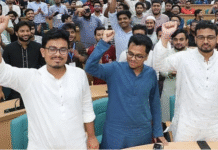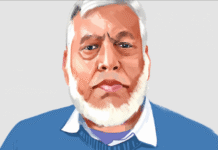
The 2014 election may well be the most significant elections we have ever had in Bangladesh. It didn’t look or feel much like an election with paltry voter turnouts, violence in several centres and chalking up a respectable death count, army patrolling the streets and people wanting to be safe rather than be a voter no matter what the now discredited EC says. Yet it’s a defining election because the impact caused by it has created a situation which affects the future of everyone. It’s not a question of if democracy will survive but a more dreadful one — asking if we will survive and in what shape. It’s amidst this sombre mood indeed that we hear declarations from the AL that people have expressed their will and the BNP claims that a moral victory has been won through its boycott. Finally, it has reached a point where the two parties have completely isolated themselves from the people and their continuous claim of legitimacy is what makes the situation so scary.
* * *
It seems that the AL has managed to reach the point it did with its roadmap and secured an election which they didn’t have to fight for. If one believes the electoral results and polls, the AL would have lost the elections. But the AL must have known what was coming and ready for it too. They had passed the 15th amendment and anticipated the BNP reaction well which has let them off the hook. But a huge price has been paid for it and miscalculations are obvious. It has become the first one-party election in our history and the attempt to make the Jatiya Party (JP) the opposition didn’t work out well. The refusal to accept the resignation of JP candidates on a technicality and having Rowshan Ershad as the alter-JP looks hardly glorious and confident. As such it looks like a defeat after 42 years of so-called independence to end up with a quasi one-party rule that is much more of a burden than thought of till now. And Ershad may well make them pay much more than they bargained for. It looks like a withered and useless Sangsad, exactly the kind we don’t need. Yes, our parliaments are hardly functional but this is hardly even that. On top of that is the shadow of BKSAL that hangs over them.
* * *
The BNP has shown itself to be a party which doesn’t have it in them to do politics in Bangladesh. Born out of the bowels of an extra constitutional intervention, its linkage with people are tenuous and its commitment to participatory democracy even less so. While Sajeeb Joy may not have it in him to influence Sk. Hasina and by public opinion is a ‘mother’s boy’, the video broadcast by Tariq Zia alone is enough to show who runs the strings of a political puppet called the BNP. But it can never strike the BNP that Tariq Zia is himself a huge baggage for the BNP and his calls for agitation against the polls makes the best argument why they should leave the political scene.
* * *
Both the BNP and the AL run their parties like a business. It’s not just big time corruption that keeps the parties going but the retail level tender and extortion that feeds the cadres are also threatened when a party is out of power. So if the party loses access to such funds, it won’t be easy to keep going after the 5th year. BNP’s disappointment with not winning is intense because the party is now threatened with shrinkage. It’s a simple question of livelihood and if the thugs that run politics in Bangladesh don’t find resources here, they will go where it is. Similarly, the AL will be emboldened and its supporters will be able to put pressure on the party to keep going after electoral victory and so a solution seems rather remote though one sincerely hopes that a miracle happens. Otherwise in a war of attrition, everyone will suffer and instability may kill both the parties.
* * *
The election per se is really not a significant event and was over even before voting began so it’s not a question of power transfer. The essential objective is that of legitimizing the regime and that legally has been done. It was never an electoral issue but a political one. So once the 15th amendment was passed, the rest really didn’t matter. BNP had swallowed the AL bait and somehow believed that the people would turn up in their favour and carry out their revolution. It was in the end, not willing to take the risks for the people by going for an election which alone could have upset the AL plan. Despite overwhelming intent for participation from within the party which may have meant a loss but certainly would have made the BNP stronger and more pro-people, they lived in their mother-son led world refusing to participate. Now they face a huge challenge of survival.
* * *
Two other factors have been thrown in, both dangerous. One is the platform for a possible Islamic militant insurgency headed by the Jamaat-e-Islami (JI) supported by their Pakistani colleagues. As the hangings go on, Bangladesh will continue to be focused and it may well lead to situations beyond control of the government. Containment of violence by the law enforcement agencies has been weak and so the concern is high.
Political negotiations and war crimes trials are separate issues and both need to be dealt with albeit separately both parties have used it to gain power. The AL has turned that into an issue of demonizing the BNP for its alliance with the JI. BNP used the violent JI cadres to push its protest, but the result has been zero gain for them and the lack of public support for the JI has made it look badly anti-people. Now it can neither swallow nor spit JI out. And the blame for future violence that may happen will have to be shared by the BNP too. If the violence goes international, Bangladesh will have to struggle at a level to survive it has never done before.
* * *
The other part that came through was the rise of India and the US as factors in local politics. Since they disagreed, and India seems to have done better on this, we may have now become a part of India’s own security strategy. India’s anxiety over support to the North-Eastern rebels and the Islamists by the BNP has made the AL, the party of choice for India but such calculations are in India’s interest not ours. India’s main enemy is Pakistan and they have routinely played a proxy war in South Asia in several countries but now that war may well become more intense and we are part of their war and on one side. That will make security issues more visible though one is not sure they can cope and how well.
* * *
So as we have faced a non-election which will produce a one-party state which is largely ignored and has caused so much violence, things don’t look good. The three main pillars of the economy — remittance, RMG and agriculture — have already started to feel the strain and should the unrest continue, the proverbial goose may get cooked rather quickly. It will produce instability and consequently security problems that may be beyond our capacity to handle.
Let’s hope it doesn’t.
Source: Bd news24









